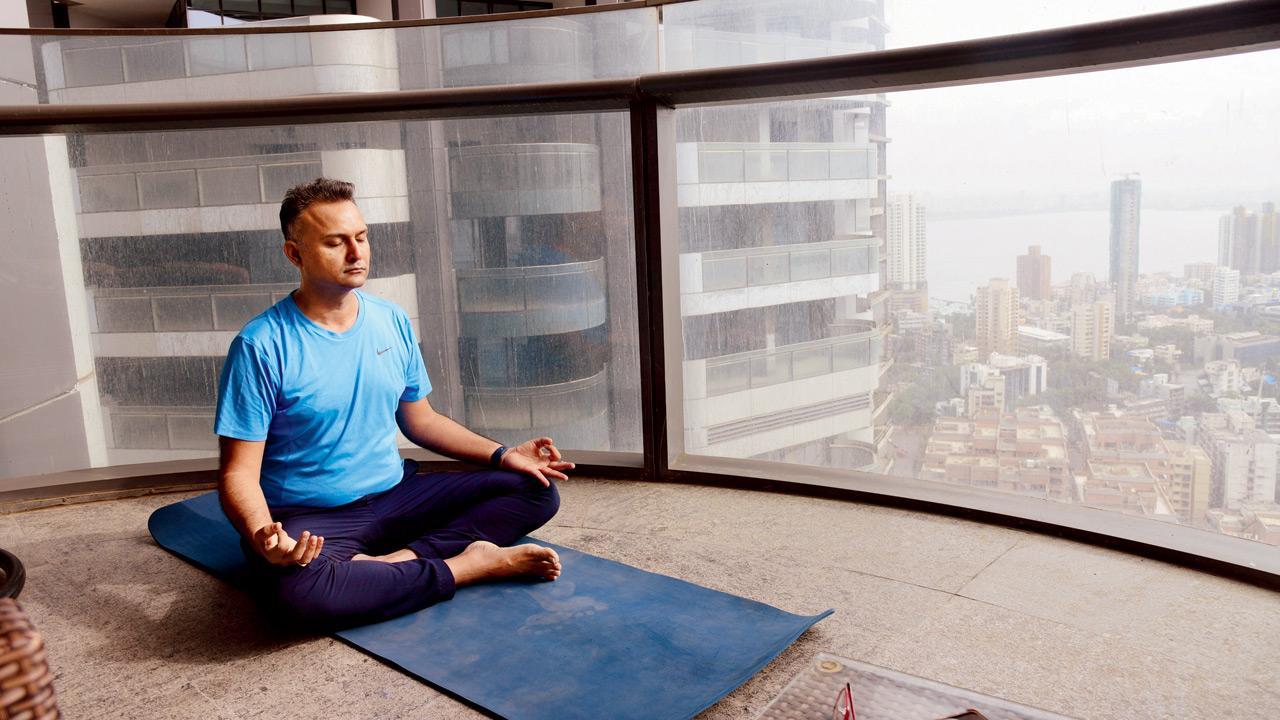With many living alone during the pandemic, the enforced isolation can take a toll on mental health. Experts on how to cope solo in the pandemic

Yogesh Jain used meditation to manage stress. Pic/Pradeep Dhivar
Before his demise, film critic and cine chronicler Rashid Irani had spoken to mid-day about how the isolation resulting from the lockdown had taken a toll on his mental health. Irani’s concerns continue to be echoed by many thousands of Mumbaikars who have found themselves living (and working) alone for more than a year now. “For many, social distancing resulted in cabin fever. It is distressing claustrophobic irritability and restlessness that is experienced when a person or group is isolated or confined for an extended period. As human beings, we are inherently social, and feel a sense of belongingness, support and security when we have people around us who we can bank on. While living alone brings its own set of challenges, the anxiety and stress have been exacerbated by the emotional, mental, and financial toll that the pandemic has taken,” explains Namrata Jain, a counselling psychologist.
ADVERTISEMENT
Engage in activities that compel you to socialise
>> Solitude, not loneliness: Solitude is an essential part of developing important skills required for emotional regulation. However, the boundary between solitude and loneliness can be blurry, says psychologist Priyanka Bajaria. She advises maintaining a diary to note down your daily activities. Reflect on the things that you enjoy doing. Now, identify and analyse when you feel dull or low. Would those times feel better in another person’s presence? What content are you consuming online and for how long? This is important to assess your blind spots in the context of loneliness, and consecutively plan further steps.
>> Establish a routine: Stick to a regular schedule as much as possible. Start each day by making a list of things you want to do. This tracking will give you a sense of control and stability, Jain suggests. Bajaria adds, “Your sleep schedule, bathing and related self-care, meal timings, exercise, household chores and active working hours form important rhythms of living. When you live alone, there is minimum accountability of these activities and it’s easier to forego schedules. All these activities (especially biological ones) have mental and physical health implications.”
>> Express regularly: If you have an inclination for an art form (visual art, theatre, stand-up comedy, or dance), engage in it by creating or appreciating it. Plan activities around it. This will also help you feel belonging to a group of people who like similar activities, advises Bajaria. “If possible, engage in the activity in a physical group setting (join a class). If there is a lockdown in your area, you can join an online community as well,” she adds.
Priyanka Bajaria and Namrata Jain
>> Try to socialise: Actively make choices that almost compel you to engage in person. For example, take yourself to a store to buy groceries instead of ordering them online. Such purposeful and deliberate activities increase engagement with other humans (passing a neighbour and waving/smiling at them, engaging with the watchman and vendors). Small things can add up. Technology makes these important activities redundant which in the long term is detrimental to our mental health, Bajaria explains.
>> Do something meaningful: If you’re bored but also feel as though you’re losing your sense of self, it’s possible that you’re suffering from a lack of meaning. Try adding meaningful activities into each day, such as taking new classes or cooking something new. You will have a feeling of purpose, if only for a short time, says Jain.
For friends, family, and caregivers, they suggest the following routines:
Regular check-ins: Make a phone call if you think they’ve been sounding low, write a letter, or use video chat services. Make them a virtual part of your family events. For elderly individuals, you could consider installing cameras in the house, says Jain.
Ask the right questions: When you speak to the individual, ask how they have been feeling as much as possible (without nagging), explains Bajaria. Some individuals may not be able to reflect on their feelings easily on their own and need a loved one to help them through it.
Mindfulness helped me tide over my loneliness
In the early days of the lockdown, my business came to a standstill and my children were studying abroad. I felt completely isolated. I knew this would take a toll on my mental wellbeing. I stuck to my daily schedule, exercised regularly and ate healthy meals. To support myself mentally, I took to meditation and reading. I began to lean more towards spirituality and used it to help me stay calm and rationalise my circumstances. I also practice mindfulness exercises. Despite these measures, there are days when I feel despondent. My new business was about to take off just as the second wave set in, and that was very frustrating for me. I have a strong circle of friends with whom can freely talk when I feel low — sharing my mental state can help to objectively assess it.
Yogesh Jain, 45, entrepreneur
 Subscribe today by clicking the link and stay updated with the latest news!" Click here!
Subscribe today by clicking the link and stay updated with the latest news!" Click here!






